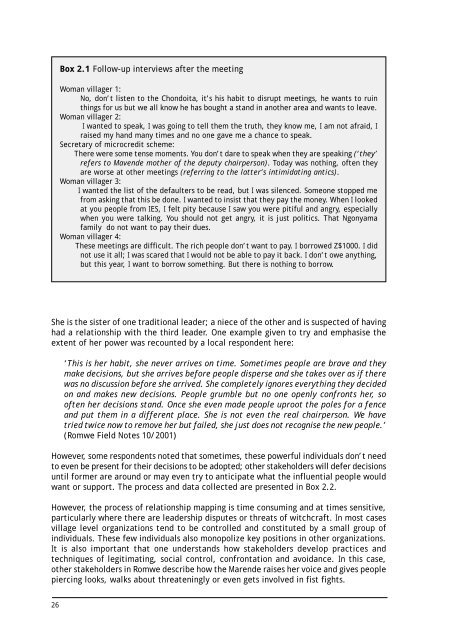Where the power lies: multiple stakeholder politics over natural ...
Where the power lies: multiple stakeholder politics over natural ...
Where the power lies: multiple stakeholder politics over natural ...
Create successful ePaper yourself
Turn your PDF publications into a flip-book with our unique Google optimized e-Paper software.
26<br />
Box 2.1 Follow-up interviews after <strong>the</strong> meeting<br />
Woman villager 1:<br />
No, don’t listen to <strong>the</strong> Chondoita, it’s his habit to disrupt meetings, he wants to ruin<br />
things for us but we all know he has bought a stand in ano<strong>the</strong>r area and wants to leave.<br />
Woman villager 2:<br />
I wanted to speak, I was going to tell <strong>the</strong>m <strong>the</strong> truth, <strong>the</strong>y know me, I am not afraid, I<br />
raised my hand many times and no one gave me a chance to speak.<br />
Secretary of microcredit scheme:<br />
There were some tense moments. You don’t dare to speak when <strong>the</strong>y are speaking (‘<strong>the</strong>y’<br />
refers to Mavende mo<strong>the</strong>r of <strong>the</strong> deputy chairperson). Today was nothing, often <strong>the</strong>y<br />
are worse at o<strong>the</strong>r meetings (referring to <strong>the</strong> latter’s intimidating antics).<br />
Woman villager 3:<br />
I wanted <strong>the</strong> list of <strong>the</strong> defaulters to be read, but I was silenced. Someone stopped me<br />
from asking that this be done. I wanted to insist that <strong>the</strong>y pay <strong>the</strong> money. When I looked<br />
at you people from IES, I felt pity because I saw you were pitiful and angry, especially<br />
when you were talking. You should not get angry, it is just <strong>politics</strong>. That Ngonyama<br />
family do not want to pay <strong>the</strong>ir dues.<br />
Woman villager 4:<br />
These meetings are difficult. The rich people don’t want to pay. I borrowed Z$1000. I did<br />
not use it all; I was scared that I would not be able to pay it back. I don’t owe anything,<br />
but this year, I want to borrow something. But <strong>the</strong>re is nothing to borrow.<br />
She is <strong>the</strong> sister of one traditional leader; a niece of <strong>the</strong> o<strong>the</strong>r and is suspected of having<br />
had a relationship with <strong>the</strong> third leader. One example given to try and emphasise <strong>the</strong><br />
extent of her <strong>power</strong> was recounted by a local respondent here:<br />
‘This is her habit, she never arrives on time. Sometimes people are brave and <strong>the</strong>y<br />
make decisions, but she arrives before people disperse and she takes <strong>over</strong> as if <strong>the</strong>re<br />
was no discussion before she arrived. She completely ignores everything <strong>the</strong>y decided<br />
on and makes new decisions. People grumble but no one openly confronts her, so<br />
often her decisions stand. Once she even made people uproot <strong>the</strong> poles for a fence<br />
and put <strong>the</strong>m in a different place. She is not even <strong>the</strong> real chairperson. We have<br />
tried twice now to remove her but failed, she just does not recognise <strong>the</strong> new people.’<br />
(Romwe Field Notes 10/2001)<br />
However, some respondents noted that sometimes, <strong>the</strong>se <strong>power</strong>ful individuals don’t need<br />
to even be present for <strong>the</strong>ir decisions to be adopted; o<strong>the</strong>r <strong>stakeholder</strong>s will defer decisions<br />
until former are around or may even try to anticipate what <strong>the</strong> influential people would<br />
want or support. The process and data collected are presented in Box 2.2.<br />
However, <strong>the</strong> process of relationship mapping is time consuming and at times sensitive,<br />
particularly where <strong>the</strong>re are leadership disputes or threats of witchcraft. In most cases<br />
village level organizations tend to be controlled and constituted by a small group of<br />
individuals. These few individuals also monopolize key positions in o<strong>the</strong>r organizations.<br />
It is also important that one understands how <strong>stakeholder</strong>s develop practices and<br />
techniques of legitimating, social control, confrontation and avoidance. In this case,<br />
o<strong>the</strong>r <strong>stakeholder</strong>s in Romwe describe how <strong>the</strong> Marende raises her voice and gives people<br />
piercing looks, walks about threateningly or even gets involved in fist fights.

















